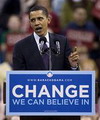| NSPM in English | |||
The Death of Liberalism in the United States |
 |
 |
 |
| среда, 13. јануар 2010. | |
|
(Global Research, January 12, 2010)
Well-known “liberals” are beginning to denounce Obama’s polices, but not the Democrats as a whole. Instead, these esteemed liberals are promoting “real progressive Democrats,” i.e. the Democrats who are used as props by the leadership of the party, and completely ignored by the corporate media. The Democrat-promoting liberals are a mixed bunch, ranging from university professors to television personalities. Their ideology has moved distinctly to the right over the decades, to conform to the general rightward movement of the U.S. political/economic establishment. And yes, liberals and many “progressives” do constitute a wing of the political establishment — they do not propose measures that would overhaul our economic and political system, but only minor reforms to make things less blatantly exploitative. Sometimes, real reforms — like single payer health care — are proposed, but quickly abandoned so that the Party agenda can be pursued (corporate health care and corporate welfare). Indeed, the corporate “elephant in the room” is rarely mentioned by liberals. They might occasionally denounce “corporate influence,” while proposing absolutely nothing concrete to address the problem. They, of course, would never mention that, while large corporations exist with their tremendous wealth and control of elections, the media and politicians will inevitably fall into servitude or corruption. At times, liberals may resort to using radical language to gain populist credentials. For example, “We need to demand that our economic system works for Main Street, not just Wall Street.” Of course this demand, under our current system, is fantasy. Our economic system (capitalism) is set up to meet the needs of rich investors (capitalists) — nothing is built, no jobs are created, unless rich owners are guaranteed a stable and large profit. Demanding that this system “works for Main Street” is either incredibly naïve, or more likely, an incredibly deceptive distraction. Distractions, of course, serve the interests of the status-quo. Mainstream liberals are notorious distraction servers. For example, they advocate “moderation,” and denounce “extremism,” even as society is clearly torn between economic extremes: the majority of working and poor people versus a tiny elite of very wealthy. The economic/political status quo is obviously broken, but to liberals, “extreme measures” must not be taken. Most Americans, however, are now looking to the right and left of the two-party system, where more concrete, “radical” solutions are being proposed. Therefore, members of the Republican Party are jumping ship to more radical right-wing parties, or — in Ron Paul’s case — about to jump ship. The Democrats, too, are losing members. Cynthia McKinney and Cindy Sheehan have abandoned the corporate-owned Democratic Party, while long-time liberal Chris Hedges and others have denounced the two-party system. But in contrast to the far-right, those who look left of the Democrats are not given spotlights in the corporate-owned media. Another radical-sounding distraction is the bemoaning over the morality of war, of ignoring the social crisis, etc., as if morality played absolutely any role in the minds of the profit-hungry corporations who dominate the government. Shaming the corporate elite will continue to produce zero changes in their policies. As the economic situation deteriorates, mainstream liberals have had to reach for other distractions, including the “war on terror”, the war against immigrants, and the war on drugs or crime. Any tactic to drag people’s attention away from Wall Street and the corporations in general is being deployed. Today’s liberals in Congress stand to the right of Nixon era Republicans: they shamelessly bail out Wall Street, wage war in the Middle East to fight “terrorism,” without ever explaining why terrorism exists. If the U.S. military would stop invading and occupying Middle East countries, while propping up dictatorships in the region — Saudi Arabia, Israel, Egypt, Jordan, Yemen,Kuwait, Iraq, Afghanistan, etc. — terrorism would cease to exist. The basis for the Democrats' giant leaps to the right has been the deteriorating position of the U.S. corporate elite. In the post-World War II era, the U.S. ruling class ruled the world uncontested (minus the Soviet states). Now, the natural processes of capitalism have re-created the competitors who were destroyed in World War II, while spawning new challengers to America’s economic/political hegemony — China, India, Brazil, etc. As a result, the wages of U.S. workers have been under unrelenting attack with the outcome that people now work more but are paid less. In the past, this international competition, along with higher wages for American workers via the labor movement, helped bring down the profits of American corporations. The U.S. corporate elite were forced to rely less on their economic dominance, and more on their military might. Unfortunately for the working class, many labor leaders have been profoundly influenced by the above mentioned liberal attitudes. Even as the number of union members drastically shrank — along with the living standards of the remaining union workers — most labor leaders advocate a moderate approach to politics, relying on false messiahs like Obama to produce change, instead of the combined strength of an active union movement. Indeed, demanding that our economic system “work for Main Street” implies a radical break from liberalism. The logical outcome of such a demand — if liberals ever chose to pursue it — is the realization that the power of the corporations needs to be smashed, something that cannot be done within the corporate-owned two-party system. The working class needs to organize itself independently to fight back against the corporations, who’ve been waging a one-sided class war for over the last thirty years. Only a bold, independent working class movement can give inspiration to the majority of people longing for a political solution to the current social crisis. Americans need real economic answers to the situation — taxing the rich, taking over mega-corporations, ending the current multiple wars, etc. — so that the fake solutions offered by the right-wing — race, religion, patriotism — do not act as a magnet to a disgruntled populace. Liberalism in the U.S. is already dead for all intents and purposes, but not everyone has recognized it, or acted upon it. Nevertheless, the first steps in achieving political independence – which amounts to breaking completely with the Democratic Party – have begun. This is because large numbers of working people have begun to think and act for themselves. Millions of people are finding it impossible to live as they’ve lived before, with their interests subordinated to those of the employers, the banks, the wealthy in general, and the government that serves exclusively the interests of these groups at the expense of everybody else. One example of independent actions being taken by working people is the campaign within the labor movement to have the AFL-CIO and the Change to Win union federations call for a mass mobilization in Washington, DC and on the West Coast in the spring to demand the Obama government deliver JOBS, PEACE and JUSTICE for all working people in the U.S. (www.wercampaign.org) Another example is the teacher unions, students, and staff unions coming together to organize the March 4th day of action and strikes to save public education in the state of California. These are examples of a great new beginning. |
Остали чланци у рубрици
- Playing With Fire in Ukraine
- Kosovo as a res extra commercium and the alchemy of colonization
- The Balkans XX years after NATO aggression: the case of the Republic of Srpska – past, present and future
- Из архиве - Remarks Before the Foreign Affairs Committee of the European Parliament
- Dysfunction in the Balkans - Can the Post-Yugoslav Settlement Survive?
- Serbia’s latest would-be savior is a modernizer, a strongman - or both
- Why the Ukraine Crisis Is the West’s Fault
- The Ghosts of World War I Circle over Ukraine
- Nato's action plan in Ukraine is right out of Dr Strangelove
- Why Yanukovych Said No to Europe

.jpg)








 It’s no exaggeration to say that President Obama was the Democrats’ last chance to maintain some level of political legitimacy in the eyes of working class Americans. Now, after a year of solid pro-corporate policies, it’s obvious Obama has failed; and with him the Democratic Party.
It’s no exaggeration to say that President Obama was the Democrats’ last chance to maintain some level of political legitimacy in the eyes of working class Americans. Now, after a year of solid pro-corporate policies, it’s obvious Obama has failed; and with him the Democratic Party.












